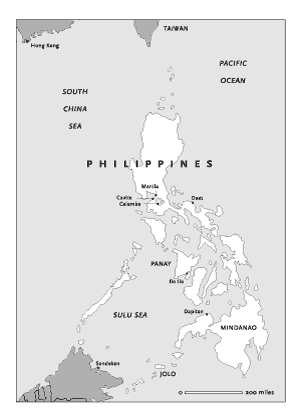Parts
i
and
ii
of this triptych (
nlr
27 and 28) explored the complex transnational contexts, literary and political, that shaped the incendiary anticolonial novels (Noli Me Tangere, 1887, and El Filibusterismo, 1891) of the Philippines’ ‘founding father’ José Rizal. Part
iii
considers how developments in Cuba, Europe, and the Far East framed his final years—and how, after Rizal’s execution, his nationalist contemporary Isabelo de los Reyes smuggled back to the American-colonized Philippines what he had learned from anarchist cellmates in the dungeons of Barcelona.
footnote1
Having packed off virtually the entire edition of El Filibusterismo to his trusted friend José Basa in Hong Kong and wound up his remaining affairs, Rizal left Europe on October 19, 1891. Except for a single sombre day, he would never set foot on it again. The timing was well chosen. The notorious Valeriano Weyler’s four-year term as Spanish Captain-General of the Philippines would end within a month. His successor, General Eulogio Despujol, was thought to be much less ferocious.
Rizal’s family had repeatedly warned him not to come back to the Philippines—with good reason. His 1887 Noli Me Tangere had been a brilliant, blistering attack on clerical cruelty and corruption. On a brief visit home after its publication he received ‘daily threats’ from agents of his well-placed enemies, and could barely leave his father’s house in Calamba. Worse, he had urged the local tenants and townspeople to take the rent-racking Dominicans to court. The vengeful Order won the case and Captain-General Weyler had ordered that the recalcitrant Calambans’ houses be torched. Copies of El Filibusterismo, whose plot centred on a (failed) attempt to blow up an unnamed (but clearly identifiable) Captain-General and incite an insurrection, would soon fall into the hands of the authorities.
His family urged him instead to settle in Hong Kong, only 800 miles from Manila, where they might hope to join him. By the end of 1891 they had been happily reunited in the Crown Colony, where the young novelist opened a successful ophthalmological practice. But his reputation as his country’s foremost intellectual leader and the terms on which he had left Europe made it difficult for him long to accede to his family’s wishes. He was besieged with letters from his more radical comrades asking him what he would do ‘next’, and promising their full support, whatever ‘next’ turned out to be.
Chto dyelat? One alternative emerges in photographic negative in a letter from the Austrian ethnographer Ferdinand Blumentritt, dated January 30, 1892:
Above all, I beg you not to get involved in revolutionary agitation! For he who stages a revolution should at the least have before him the likelihood of success, if he does not wish to have his conscience burdened with useless bloodshed. Whenever a people has rebelled against another people dominating it, or a colony against the Motherland, the Revolution has never succeeded solely on the basis of its own strength. The American Union became free because France, Spain and the Netherlands allied with it. The Spanish republics became free because civil war raged in the Motherland, and England and North America provided money and guns. The Greeks became free because England, France and Russia offered their support. The Rumanians, Serbs and Bulgarians were liberated by Russia. The Italians were liberated thanks to France and Prussia, and the Belgians thanks to England and France. Everywhere, those peoples who relied ‘solely’ on their own strength were crushed by the soldiery of Legitimacy: the Italians in 1830, 1848 and 1849; the Poles in 1831, 1845 and 1863, the Hungarians in 1848 and 1849, and the Cretans in 1868.footnote2
Blumentritt went on to say that no revolution of this kind has any chance of success unless: 1) parts of the enemy’s army and navy mutiny; 2) the Motherland undergoes civil war or external attack; 3) money and weapons have been prepared well beforehand; 4) a foreign power officially or secretly supports the insurrection. ‘Not one of these conditions is met in the Philippines [today]’.
